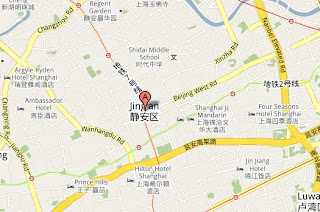The Year 2006 was the Year of Italy and China , during which the Culture Office of the Consulate General of Italy in Shanghai has organized in Shanghai
It is also the year in which a successful cooperation with the Jing’an District has started. The first event has been the installation of a sculpture of Carlo Goldoni, the famous Italian play writer, in what it is called now”the road of the play writers”, i.e. Hua Shan road.
That brilliant event, organized with the highest authorities of Jing’An District and Italian diplomacy, was also the occasion for the signing of a multi-year agreement between the famous “Piccolo Teatro di Milano” and the “Shanghai Theater Academy
The second event took place at the beginning of June 2007, when a folkloric group from Italy
The third event has been in this year, on 31 July 2008. With friendship and kind generosity, the Jing’An district has agreed to organize an “Italian Day”, featuring a concert of the famous violinist Vittorio Di Lotti and the “enchantment quartet” of the young professors of the Shanghai
The fourth event has been held at the cultural center of the Jing’An district on the 1st of June, 2008, when myself animated a conference on the meaning of Vivald’s famous piece of music: the four seasons.
Apart from these main cultural events, our cooperation has invested many other occasions, when I have been invited to enjoy spectacular cultural shows and performances organized by the district.
During this time, in which I have the honor to address such important audience, I would like to formulate some suggestions on the relations between culture and economy.
I always repeat the slogan:
CULTURE IS LIFESTYLE; LIFESTYLE IS BUSINESS
Last year was the bi-millenary anniversary of the death of Maecenas, the Minister of the Roman Emperor Augustus.
He was the first “manager of culture”, so much famous that the word “mecenatism” is now worldwide recognised as a synonym for culture management, sponsorship, communication and publicity through culture.
A service industry is in itself a culture affair. The concept of service is linked to the concept of need.
One needs to eat and there is food industry.
One needs to be dressed and there is clothing industry.
And so on.
Why Italy
Because in 2000 years Italy
The quality of life in Italy
Jing-an district is at the forefront of Chinese culture in Shanghai and this part of China , and can effect a “leap of quality” following the example of Italy
400 years after the historical friendship between Xu Guangqi, Li Madou and Xiong Sanba, Jing-an could develop close cooperation with the Italian Cultural Institute in:
1. setting models and examples of good lifestyle (to create potential customers);
2. helping and identifying “lifestyle industries”: gymnasiums, fashion industries, “niche” restaurants, lifestyle clubs;
3. Introducing quality habits in the behaviour of citizens: dental services, beauty, entertainment, books, children education.
4. promoting the image of Jing-an District and enhancing the communication, through website and blog of testimonials. To give you an example, I have set my personal blog one week ago and – without any personal promotion – I have 100 visits a day so far.
The Ambassador of Italy in China says: Italy and China
Hand in hand they can lead the lifestyle of the 3rd Millennium.


意大利驻沪总领事馆文化处与静安区文化局之间的合作:
RispondiElimina国际化的成功例子
在2006中国意大利年期间,意大利驻上海总领事馆文化处共组织了将近200项活动,涵盖从音乐会到戏剧、从艺术展览到讲座等多种形式。
正是在2006年,我们开始了与静安区的良好合作。第一项活动是意大利著名戏剧家卡洛•哥尔多尼的雕像在如今被称为“戏剧大道”的华山路落成。这一精彩活动由静安区最高领导层和意大利外交部共同主办,期间,著名的“米兰小剧院”还与上海戏剧学院签订了长期合作协议(其成果是上海2010年世博会期间将进行合作演出)。
第二项活动于2007年6月初举行:一支来自意大利的民俗团体在静安公园附近的静安寺广场表演。将近40位意大利年轻人身穿意大利文艺复兴时期的精美服装,表演了杂技和舞旗。
第三项活动于2008年7月31日举行。出于友谊和慷慨,静安区同意举办“意大利日”活动,期间举行了著名的小提琴家维多里奥•迪•洛蒂与上海音乐学院年轻教师的音乐会。富丽堂皇的百乐门舞厅成为了来自意大利18世纪难得一闻的美妙音乐的演奏的舞台。
第四项活动于2008年6月1日在静安区文化馆举行:我本人作了维瓦尔蒂著名协奏曲《四季》的欣赏讲座。
除了这些主要的文化活动,我们的合作还延伸到其他的一些方面,如我被邀请观看由静安区主办的文艺演出。
今天,有幸在如此重要的观众面前讲话,我也想就文化和经济之间的关系提出一些我的拙见。
我经常喊出我的口号:
文化即生活方式;生活方式即商机
去年是罗马皇帝奥古斯都的大臣米西奈斯逝世2000周年。
他是第一位“文化经理人”,他在西方世界极为著名,以至于“米西奈斯主义”一词已成为文化管理、资助、传播和通过文化进行宣传的代名词。
因此,意大利是文化即商机这一概念的发源地。
服务业本身也是一种文化事业。服务的概念与需求的概念紧密相连。
人们需要进食,从而产生了餐饮业。
人们需要穿衣,从而产生了服装业。
诸如此类。
为什么意大利服务业能在全世界服务业中独占鳌头?
因为在过去的2000年中,意大利完成了从满足基本需求(吃、穿等等)到“生活质量”概念的“质的飞跃”,从而得以创造出并弘扬“意大利生活方式”。
正是由于意大利人在日常生活中所表现出来的“对美的崇拜”,意大利的生活质量被认为是全世界最高的。
在上海及其周边地区中,静安区都无疑站在中国文化的前沿,参考意大利的例子,也完全可以实现“质的飞跃”。
继400年前徐光启、利玛窦和熊三拔之间的友情之后,静安区可以与本文化处在以下几个方面开展紧密合作:
1. 树立高品质生活方式的典范(创造潜力顾客)
2. 帮助与识别“生活方式产业”:健身房、时尚产业、“定制”餐厅、生活方式俱乐部
3. 向市民介绍高品质生活习惯:牙医服务、美容、娱乐、阅读、儿童教育
4. 提升和推广静安区形象,通过网站和博客加强沟通。如:我一周前我开通了我的个人博客,并且,在没有进行任何个人推广的情况下,每天有100人次的点击率。
意大利驻华大使常说:意大利和中国是世界上两个“文化超级大国”
相信中意两国可以并肩引领第三个千年的生活方式。